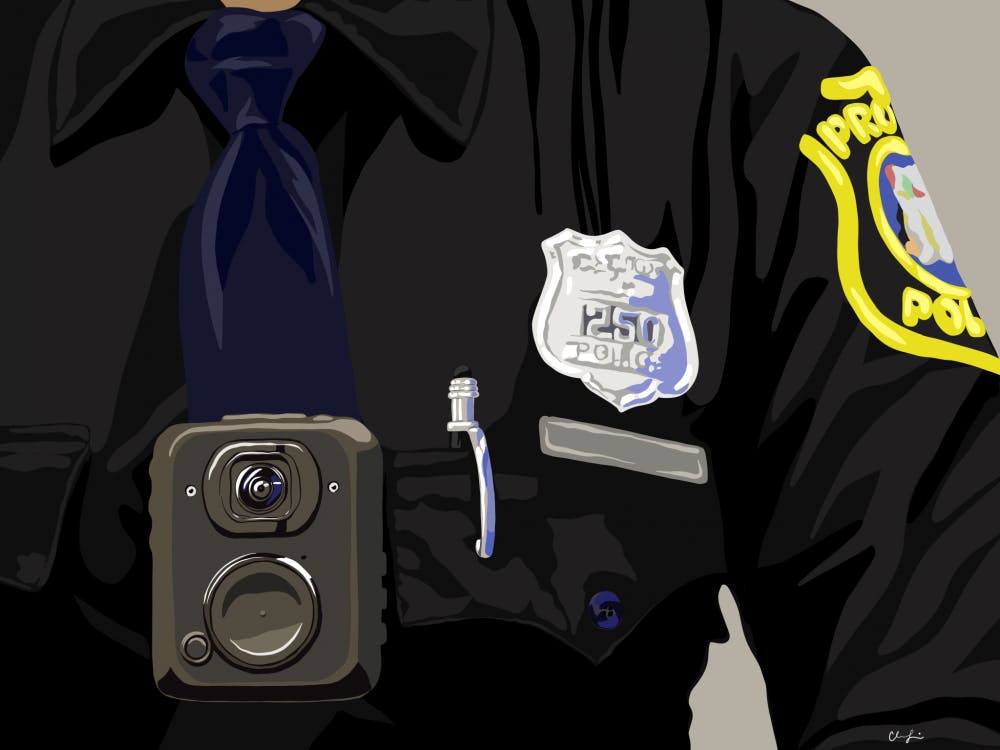The American Civil Liberties Union of Rhode Island wrote a letter on Jan. 15 to Providence Chief of Police Hugh Clements Jr. and Commissioner of Public Safety Steven Paré imploring them to take actions that “ensure stronger compliance” of the Providence Police Department’s body camera policy.
Though the PPD is working to increase compliance, researchers and external reviewers emphasize that body camera activation may be more useful for providing evidence than for preventing police misconduct.
The PPD’s body camera policy requires officers to activate their cameras whenever there is “reasonable suspicion that someone is or may be involved in criminal activity,” when force is being used and when investigating potential illegal activities, such as traffic stops and building searches, according to the Providence Journal. The policy was implemented four years ago.
But according to the ACLU of R.I.’s letter, written by its Executive Director Steven Brown, many police officers failed to activate their body cameras in three of the most publicized instances of alleged PPD misconduct over the past year, including three officers involved in Jhamal Gonsalves’ moped crash Oct. 18, which left Gonsalves in a two-month coma. Gonsalves remains in long-term care. In each of these instances, Brown wrote that “no officer received anything more than a verbal reprimand for this blatant violation of departmental (body camera) policy.”
“The body camera policy is regularly flouted, violations are rarely punished and the transparency these cameras are supposed to provide the public is undermined,” Brown wrote. He added that he believes the 20 body camera activation violations, which had been reported between January 2018 and June 2020, underrepresented the actual number of violations due to what he believes is an “extremely lacking” auditing process.
In response to the letter’s allegations of insufficient discipline following violations, Clements told The Herald that the department utilizes a range of disciplinary actions depending upon the circumstances of the incident. The department takes into account whether the violation was repeated and whether the incident was abrupt or life-threatening, among other factors. Officers have been suspended in the past for violating the policy, he added.
The Providence Department of Public Safety conducts “regular internal audits and compliance checks” for body cameras, Public Information Officer for the Providence Department of Public Safety Lindsay Lague wrote in an email to The Herald.
According to Clements, the police department’s auditing process has shown a body camera activation compliance above 90 percent. Clements believes that 90 percent is “very good,” but hopes to improve.
Body camera activation played a crucial role in the investigation of another incident of police misconduct cited in the ACLU of R.I.’s letter. Providence Police Sgt. Joseph Hanley allegedly punched, kicked, taunted and kneeled on the neck of handcuffed suspect Rishod Gore during his arrest in April 2020, according to a report released by the Providence External Review Authority. The PERA is responsible for investigating officers in the Providence Police Department for allegations of misconduct, according to their website.
While three officers were on the scene, only one — not Hanley — had activated their body camera, according to the ACLU’s letter. PERA’s report stated that they were only able to document these violations from the single active body camera video, as well as a civilian recording.
Jose Batista, former executive director of PERA, said that he was fired for releasing the body camera video and civilian recording of Gore’s arrest to the public despite a vote from the PERA board to withhold public release of the evidence because Hanley’s criminal trial was still underway. Batista told The Herald that such body camera footage could bring “the ugliness” of police misconduct to the public’s view.
Batista wrote in an op-ed in the Providence Journal after his firing: “I was willing to bet a $90,000 salary that allowing the public to know and confront the full facts about what took place on the night of April 19, 2020, would sooner yield more meaningful, efficient and permanent justice versus the one-count misdemeanor complaint produced by our law-enforcement apparatus behind closed doors.”
Still, Batista warned that compliance with the body camera policy alone would not resolve instances of police misconduct. “Body cams are not stopping violence, not stopping killings and shootings,” he said, but they do “collect more evidence.”
Brown echoed the sentiment. “The use of police body cameras is not a panacea,” he told The Herald. “But it certainly is a big step forward. It provides some evidence that can be used to try to figure out exactly what happened in any given case.”
A 2019 study, conducted by Director of The Policy Lab at Brown David Yokum and others, randomly assigned body cameras to half of the officers in the Metropolitan Police Department in Washington, D.C. to investigate whether officers would be less likely to act inappropriately in the “heat of the moment” if they knew they were being filmed, according to Yokum. Researchers found that police body cameras “did not meaningfully affect police behavior on a range of outcomes, including complaints and use of force.”
Yokum believes that a variety of factors could explain their results, such as the possibility that live filming is not enough to significantly mitigate aggressive behavior by police. Another possibility is that the use of force by police officers could have been justified by the circumstances in most cases, Yokum said.
He added that companies are developing new body cameras that will activate automatically for officers, which could reduce the department’s alleged noncompliance in the future.
While there was not a basis for the ACLU to pursue legal action against the department for the alleged lack of adherence to the body camera policy, Brown said that a lawsuit could theoretically be filed for individual cases.
“Whether it has been deliberate or inadvertent is unclear on some of the occasions,” Brown added. “But it indicates that there's a serious problem that needs addressing.”

ADVERTISEMENT




